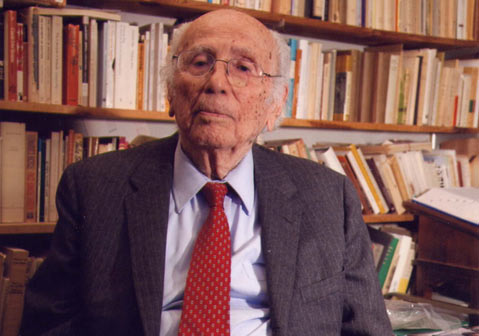
Professor Luis Leal died at the age of 102 after a long career that was almost legendary. He was a distinguished and prolific scholar whose career spanned over parts of seven decades. Born in Linares, Nuevo León (Mexico) in September 17, 1907, he experienced the Mexican Revolution, the Great Depression, World War II (as a soldier), the Civil Rights era, the Chicano Movement, the establishment of the first PhD in Chicano Studies in the United States at UCSB, and the financial collapse of the last decade. He taught at the University of Chicago, the University of Mississippi, Emory University, the University of Illinois at Champaign-Urbana (17 years), and finally UCSB (30 years), along with short stints at Stanford University and UCLA.
He originally immigrated to the U.S. to study mathematics in 1926 and he eventually switched to Latin American literature. For his doctorate he focused on Mexican literature, a field that in the l940s and l950s was virtually ignored by the academy. He became the world expert on the Mexican short story, later expanding into the Latin American short story. Shortly after his retirement from the University of Chicago at Champaign-Urbana in 1976, he moved to Goleta where he developed another career: Chicano literary history.
While at UCSB he greatly expanded his work, eventually publishing 45 books and over 400 articles. In the academy, he is considered to have garnered the most homages from former students and colleagues: a total of 20. He also directed 44 dissertations, collaborated in dozens of literary journals, founded one local journal (Ventana Abierta) and participated in an ongoing television program with Professor Víctor Fuentes called Celebración.
His initial notoriety was principally due to his unmatched Breve historia del cuento mexicano (Brief History of the Mexican Short Story) from 1956 that well exhibits his meticulous and original research. He also produced a popular book on Mexican culture titled México: civilizaciones y culturas (Mexico: Civilizations and Cultures), in addition to monographic studies on Mexican novelists Juan Rulfo and Mariano Azuela (the latter, the author of Los de abajo or The Underdogs). His interest in the Mexican Revolution peaked with his book Cuentos de la Revolución (Short Stories of the Mexican Revolution). He is also considered to be the top expert on the subject of Latin American Magical Realism and overall Mexican literature.
But he also developed a particular liking for Mexican oral tradition on both sides of the border, thus publishing his greatly admired collection Myths and Legends of Mexico and his provocative Día de los muertos (Day of the Dead). Some of his more outstanding work in the field of Chicano literature are the following: Aztlán y México: perfiles literarios e históricos (Aztlan and Mexico: Literary and Historical Profiles), No Longer Voiceless, and over 100 articles on Chicano or U.S. Latino authors and topics. His studies on Chicano literary history have been seminal by clearly outlining the origins of such a tradition as far back as the middle 1550s.
His scholarly trajectory is well chronicled, but his life has been just as remarkable. He is generally regarded as one of the founding members of contemporary Chicano literary movement. His fame is such that many in his multiple fields refer to him as “el maestro de maestros” (the teacher of teachers) for directly mentoring generations of students, teachers, and scholars. His students regarded him as a walking encyclopedia with a prodigious memory, even at times providing exact pages of works where specific topics could be located. His life reached a crescendo with his l00th birthday in 2007 with a dual conference at UCSB and Mexico City dedicated to him along with a book (100 años de lealtad/100 Years of Loyalty; In Honor of Luis Leal) that consisted of over one hundred contributors and 1,456 pages: a monumental work for a scholar who has touched so many lives with his erudition, generosity, encouragement, example, and humor. Professor Leal was also a tireless community participant, having served as a boardmember of La Casa de la Raza and other organizations.
His many achievements led to numerous awards and recognitions, such as the Santa Barbara Hispanic Achievement Council award and the Scholar of the Year by the National Association for Chicano and Chicana Studies. His awards increased in stature and significance in the later stages of life, with the prestigious Aztec Eagle in 1991 from Mexican President Carlos Salinas de Gortari, partly responsible for establishing the Luis Leal Endowed Chair in Chicano Studies at UCSB in l995. In 1997, he received from President Bill Clinton the National Medal for the Humanities. He completed his teaching career at UCSB in 2006. His life has been an inspiration for many, but most will remember forever his galvanizing personality, intellect, and charisma.



